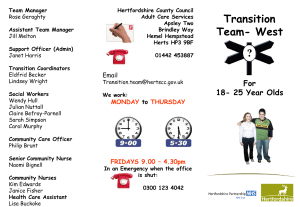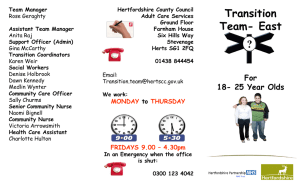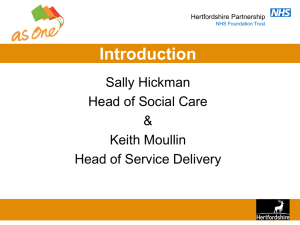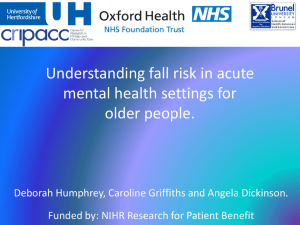Keeping Well at Work
advertisement
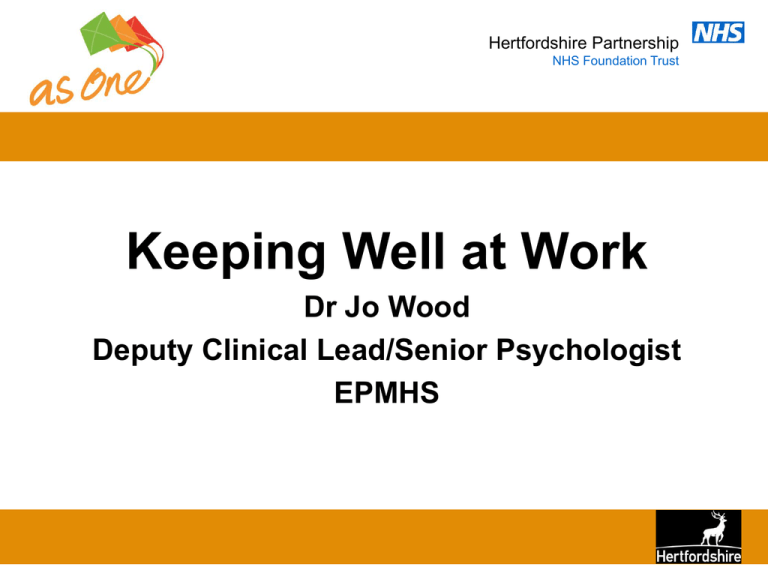
Hertfordshire Partnership NHS Foundation Trust Keeping Well at Work Dr Jo Wood Deputy Clinical Lead/Senior Psychologist EPMHS Hertfordshire Partnership NHS Foundation Trust Overview of Talk • Common Mental Health Problems • Supporting people • Introduction to EPMHS/IAPT and other resources • Case Study Hertfordshire Partnership NHS Foundation Trust Time to get moving… Hertfordshire Partnership NHS Foundation Trust How many people experience common mental health problems in the course of a year? a: 1 in 4 b: 1 in 10 c: 1 in 20 http://www.mentalhealth.org.uk/help-information/mental-health-statistics Hertfordshire Partnership NHS Foundation Trust Common Mental Health Problems • • • • • Major Depression/Low Mood Panic Worry/GAD Phobias OCD (Obsessive Compulsive Disorder) Hertfordshire Partnership NHS Foundation Trust Major Depression/Low Mood • What is it? Depressed mood most of the day – feeling sad or empty, appearing tearful (DSM-IV,1994) • Symptoms? Reduced activity, weight loss/gain, insomnia/hyper-somnia, agitation/slowness, fatigue, feelings of worthless/guilt, poor concentration, thoughts of death (symptoms not due to drugs, bereavement etc). • How might it present at work? Lateness and sickness, tired all the time, appearing uninterested, bad tempered, slow, may make lots of mistakes due to poor concentration. Hertfordshire Partnership NHS Foundation Trust Panic disorder (Panic attacks) • What is it? Recurrent unexplained Panic Attacks, worry about having additional panic attacks, worry about “having a heart attack”, “going crazy”, “going to die”, “losing control”. • Symptoms? Panic attacks =discrete periods of intense fear/ discomfort experiencing 4 or more of the following: palpitations, sweating, shaking, shortness of breath, chest pain, nausea, feeling of choking, dizziness, fear of losing control/ going crazy, tingling, hot flushes • How might it present at work? Avoiding/ escaping situations, sensitivity to heat or being in confined situations, excuses to avoid. Hertfordshire Partnership NHS Foundation Trust Worry/GAD (Generalised Anxiety Disorder) • What is it? – Excessive anxiety and worry, occurring more days than not and for at least 6 months, about a number of events of activities (DSM IV, 1994) • Symptoms? – Restless, worry, feeling on edge, easily fatigues, poor concentration, irritable, tense, sleep disturbance (DSM IV, 1994) • How might it present at work? – Poor attendance or lateness, arguments, short attention span, easily distracted, taking longer to get things done. Hertfordshire Partnership NHS Foundation Trust Social Anxiety • What is it? – A marked or persistent fear of social or performance situations where the person is exposed to unfamiliar people or the scrutiny of others and in which they fear they will act in a way that will be embarrassing or humiliating (DSM IV, 1994) • Symptoms? – Palpitations, sweating, hot, dizzy, shortness of breath, chest pain, nausea, depersonalization • How might it present at work? – Unwilling or failing to attend meetings / give presentation, struggling with customer contact, asking to move departments, poor attendance Hertfordshire Partnership NHS Foundation Trust Phobias • What is it? Marked and persistent fear that is excessive or unreasonable, cued by the presence or anticipation of a specific object or situation (e.g., flying, height, animals, receiving an injection, seeing blood). • Symptoms? Immediate anxiety response (as in panic) • How might it present at work? Avoidance of the specific object or situation Hertfordshire Partnership NHS Foundation Trust OCD (Obsessive Compulsive Disorder) • What is it? Obsessions (also known as compulsions) in the form of recurrent and persistent thoughts, impulses or images that are experienced as intrusive and inappropriate and cause marked anxiety or distress • Symptoms? Repetitive behaviours (also known as rituals) such as hand washing, ordering, checking or mental acts such as praying, counting etc – all performed in response to the obsessions • How might it present at work? Lateness at work, slowness in work tasks, procrastination, rituals at work Hertfordshire Partnership NHS Foundation Trust Substance Misuse/Addictions • What is it? Maladaptive pattern of substance misuse leading to impairment or distress. Alcohol, amphetamines, cannabis, cocaine, etc • Symptoms? Need for increased amounts of substance, persistent desire or unsuccessful efforts to cut down or control substance use. Giving up activities, low mood. Withdrawal – insomnia, agitation, nausea etc • How might it present at work? Lateness and sickness, employees borrowing money/asking for an advances in pay, agitation, belligerence, attention/memory problems Hertfordshire Partnership NHS Foundation Trust Other mental health conditions • Schizophrenia • Bi-polar disorder Hertfordshire Partnership NHS Foundation Trust Can you spot which of these famous people suffered from mental health problems? Abraham Lincoln Winston Churchill Bill Oddie Kirsten Dunst William Blake Agatha Christie John Lennon J.K. Rowling Ernest Hemingway Hertfordshire Partnership NHS Foundation Trust QUIZ Hertfordshire Partnership NHS Foundation Trust 1. If an employee was struggling to get to work on time. What might their difficulty be? 2. A manager calls in sick every-time they are due to be in a meeting. What could be wrong? 3. An employee complains of getting hot and dizzy and asks to leave the office. Why could this be? Hertfordshire Partnership NHS Foundation Trust Supporting Workers 1. 2. 3. 4. Is there a problem? – asking questions Listening Practical Help Signposting Hertfordshire Partnership NHS Foundation Trust 1. How do I know if there is problem? • ASKING QUESTIONS – What, Where, How……(Keep them open) – What seems to be the difficulty for you? – How long has it been a problem? – What support do you think you need at the moment? Hertfordshire Partnership NHS Foundation Trust 2. Listen • Active listening – using appropriate body language, summarising, reflecting back the concerns and emotions, showing empathy “… that sounds very difficult for you” “… that couldn’t have been easy “…..so that was really upsetting for you” Hertfordshire Partnership NHS Foundation Trust 3. Practical Help • If employee off work – Stay in regular contact – Encourage regular contact within the working environment • If employee at work – Break down tasks – Task allocation (not isolating or avoidance) – Expectations (may need to set more goals) Hertfordshire Partnership NHS Foundation Trust 4. Sign-posting (or telling people what help is available) • GP • Emergencies – A and E, Samaritans etc • Therapy – CBT (Cognitive Behaviour Therapy) – Counselling – Support Groups – Local agencies Hertfordshire Partnership NHS Foundation Trust IAPT (Improving Access To Psychological Therapies) What is IAPT? We provide short term interventions and therapy to help people overcome emotional difficulties. Who can access our service? Self-referral or referral from health professionals can be made by contacting: 0300 777 0707 http://www.hertspartsft.nhs.uk/our-services/communityservices/enhanced-prmary-mental-health-servcies/ Hertfordshire Partnership NHS Foundation Trust CBT (Cognitive Behavioural Therapy) What is CBT? A talking therapy based on the principle that emotions are related to the interactions between thoughts, behaviours, and physical sensations. How does CBT work? By teaching how to change thinking and behaviours, which can help manage emotions. CBT tools can be adapted and used daily by everybody Hertfordshire Partnership NHS Foundation Trust Other services and useful resources • • • • • • Bereavement Counselling (Cruse): » 08444 779 400 Addictions (The Living Room): » 01438 355 649 Debts (Consumer Credit Counselling Service): » 0800 138 1111 Relationship counselling (Relate): » 0300 100 123 Drug and Alcohol Recovery Services (CRI): » 01727 847 277 General counselling: www.babp.co.uk • • • • • • Mind: www.mind.org.uk Rethink: www.rethink.org Institute of Psychiatry: www.kcl.ac.uk/iop Mood Gym: www.moodgym.anu.edu.au Living Life To The Full: www.llttf.com Get self-help: www.getselfhelp.co.uk Hertfordshire Partnership NHS Foundation Trust Case Study • Read the case study and consider how you would manage the situation – what would you do? Hertfordshire Partnership NHS Foundation Trust Bob • Bob is a 46 year old male. He is employed as a manager and has been for the past 22 years. He is struggling to keep up with the demands of work. He spends all of his spare time worrying about work and checking his emails to make sure that everything is done. He is snapping at colleagues and feels tense all the time. He is having trouble sleeping at night and has started drinking a bottle of wine each evening to help him get to sleep. He can’t see a way out of this and is considering going off sick. Hertfordshire Partnership NHS Foundation Trust Top Tips: to advise someone with common mental health difficulties • • • • • • • • • Get active – do things you’re avoiding Time to talk Avoid drugs or alcohol Recognise unhelpful thinking Be around other people You’re not alone Seek support Call your GP Take time for you – relax Hertfordshire Partnership NHS Foundation Trust Five Ways to Wellbeing 1. 2. 3. 4. 5. Be active Connect Keep Learning Give Take Notice (Foresight, 2008) Hertfordshire Partnership NHS Foundation Trust Questions?

